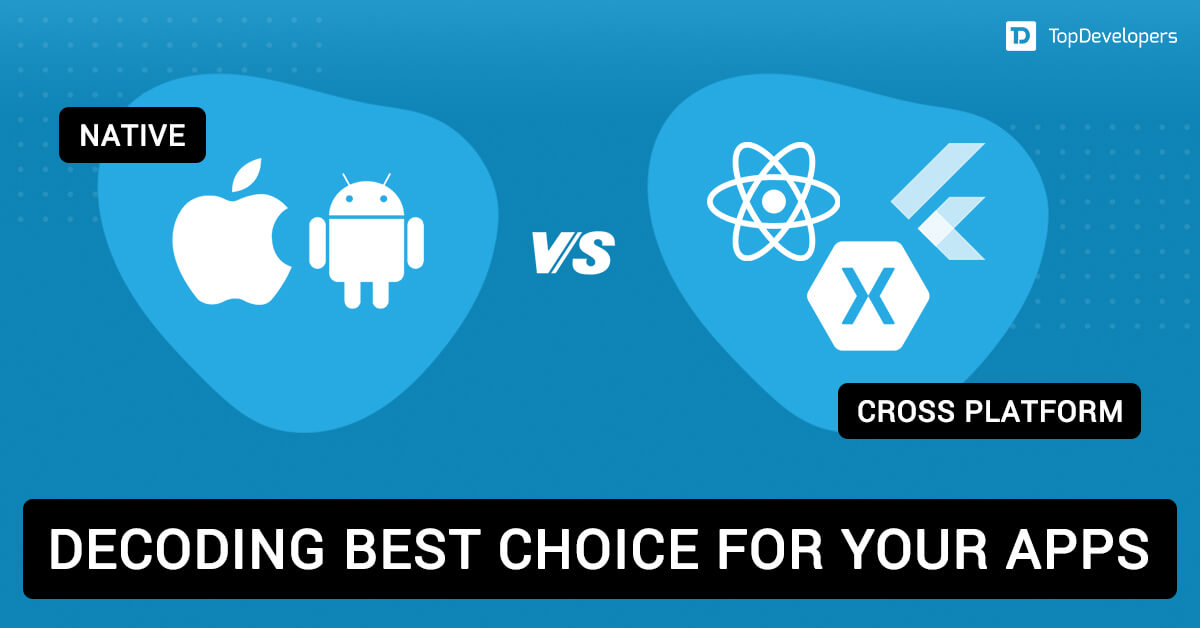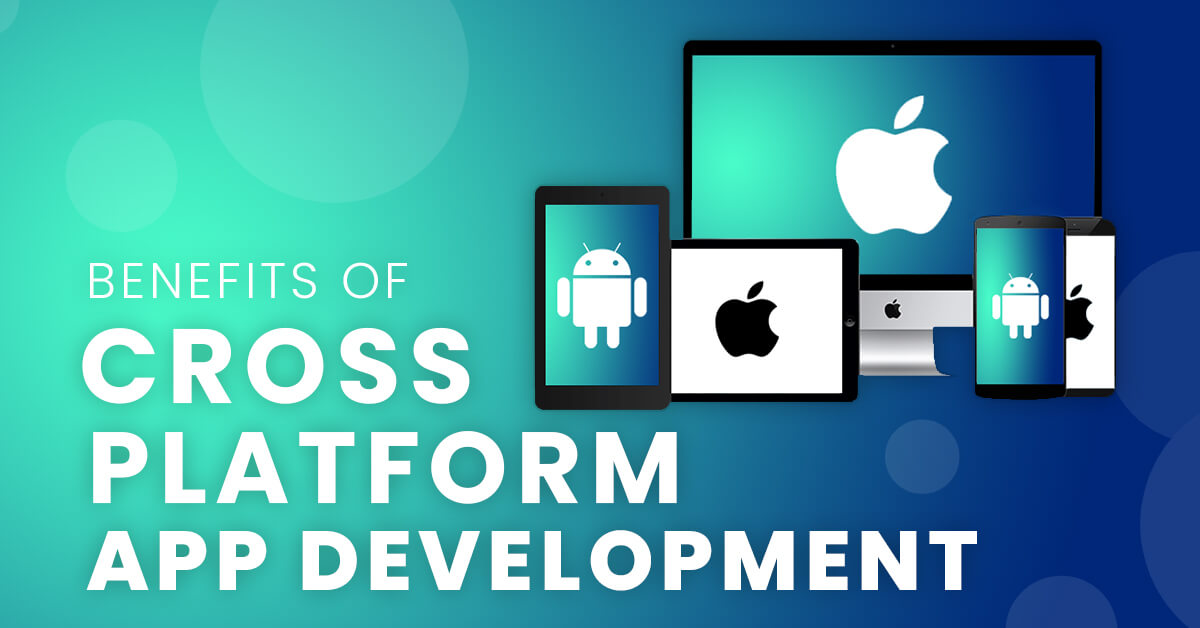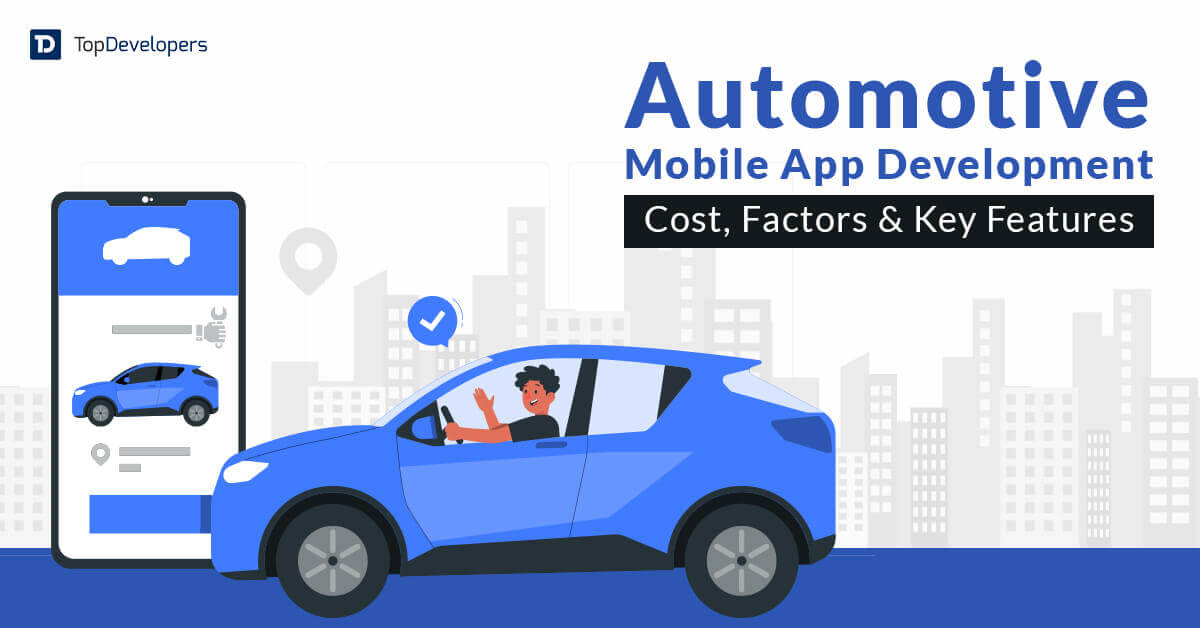
Mobile apps are important in digital innovation, with businesses constantly striving to meet user expectations in an increasingly competitive market. As of 2025, the global mobile app market continues to thrive, fueled by 4.6 billion active smartphone users worldwide and is forecasted to reach 5.83 billion by 2028. This growth underscores the importance of choosing the right app development approach to achieve success in this dynamic environment.
When embarking on a mobile app development journey, one of the most critical decisions businesses face is selecting between native and cross-platform development. Both approaches have unique strengths and challenges, and the right choice often depends on factors like project scope, target audience, budget, and long-term goals. To help make this decision effectively, many businesses turn to experienced mobile app development companies that offer personalized guidance and expertise.
This blog offers a detailed comparison of native and cross-platform mobile app development, exploring their core differences, use cases, and advantages. By the end, you’ll have a clear understanding of which approach aligns best with your business objectives. Let’s get started!
Table of Contents
- What is Native app development?
- What is Cross-platform development?
- Understanding the Core Differences: Native vs Cross-Platform
- Native vs Cross-Platform: A Head-to-Head Comparison
- Why choose cross-platform mobile apps over native apps?
- Which development approach is better – Native vs Cross-platform?
- Frequently Asked Questions
- What factors should I consider when choosing between native and cross-platform development?
- Native or Cross-platform app development: Which development approach is better for startups?
- Can I switch from cross-platform to native app development later?
- Can I switch from native to cross-platform app development later?
What is Native app development?
Native app development involves building platform-specific apps for Android, iOS, and others, which requires optimum expertise in the core programming languages and tools. The developer must be well-versed in Objective C and Swift for iOS app development and have proficiency in Kotlin or Java for Android app development.
The platform can be leveraged to the core which in turn yields high performance and provides a great user experience. The built-in capabilities of the platform help in tapping inside all the device functionalities such as camera, GPS, microphone, etc. As the native apps enable maintaining the individuality of the Android and iOS platforms, the UX will be emphatic and phenomenal for the customers here.
The native development requires hiring Android app developers and iOS app developers separately to get build Native Android and iOS apps.
What is Cross-platform development?
Cross-platform development is about building a mobile app that runs seamlessly across different platforms and is easily deployed. It is usually cheaper and offers faster deployment for a solution as this approach eliminates the need to create two separate versions for the Android or iOS platforms.
React Native, Flutter, and Kotlin are popular cross-platform frameworks that don’t require programmers to learn different languages for iOS and Android app development. It indicates if you hire Flutter app developers or React native developers, there’s no need to search for talent that are well-versed in different technologies and tools required to build Android and iOS app individually. Also, there’s a list of the top Cross-platform app development service providers can help you resolve the challenge of building an app within a short budget and in reduced time-to-market.
Understanding the Core Differences: Native vs Cross-Platform
Choosing the right mobile app development approach is crucial to your project’s success. Native and cross-platform development are the two leading options, each with unique advantages and challenges. Here, we explore these approaches side by side, analyzing their impact on critical factors like performance, cost, time-to-market, and user experience. By understanding the differences between them, you can make an informed decision that aligns with your business goals.
Time to market
In the dynamic world, if the time-critical apps are not launched at the right time, their purpose to build is not served. If you want to take the market advantage of the app, then ensuring a timely launch is all-important. The apps that are developed in reduced time consequently diminish the time to market the app. Therefore, the cross-platform development approach wins by a large fraction as it enables building an app for multiple platforms in minimum time as compared to the native development approach.
That’s the reason Walmart- the retail giant considered react native- the cross-platform framework to incorporate a few features on all the platforms with shared business logic. The reduced development time and code testing enable Walmart to accomplish the desired goals.
Winner: Cross-platform development approach wins.
Ease of testing
App testing is important as it ensures the quality of app and helps to improve UI, and releasing the app without rigorous testing means launching the app with loose ends that users don’t like at all. The app launched with bugs, crashes, and design resolution issues ultimately making the app fail as users show zero tolerance for a single error.
Native apps are built with different coding for every platform, which multiplies the code testing, UI testing, performance testing, and other testing efforts by equal folds.
On the flip side, cross-platform development involves testing code just once as the same codebase is shared across all the platforms while wrapping it in native containers. It enables the testing team to implement the changes and then test the app as if it’s done natively.
Winner: Cross-platform app development gains an upper hand over native development.
Customization efforts
Developing an app according to your business vision helps in reflecting the brand. That’s where bringing a personalized brand feel into the mobile application is vital, which delivers a personalized user experience. This, in turn, helps in increasing the conversion rate by a large fraction.
Here, the native app development approach gains an edge as OS-specific UI components make it easier for custom app development according to branding-specific needs. For instance, building a music app requires Bluetooth and audio support, that’s best received in native app development as the customized APIs support hardware integration. Also, native libraries, native components, and easy integration with OS make native apps a great fit.
The cross-platform development approach enables customization with integration capabilities and easy third-party integrations to a certain limit, which makes cross-platform an optimal solution.
Winner: Native development approach is an ideal solution for developing custom apps and intrinsic and platform-niche features are to be used.
Performance gains
In the modernized world, there is no room for performance issues. If it exists, the business is certainly out of the market. Here, we will compare both development approach that excels in terms of performance.
One of the top benefits of Native apps is performance. These apps stand high on the performance ladder because of the hardware support, device in-built capabilities, computing, database handling, read-write capabilities, operational efficiencies, and more.
On the other hand, the cross-platform development approach lags behind 40% of the native OS-specific apps. Cross-platform apps take a little more time to load the image as opposed to native apps. Cross-platform apps take reduced time for read-and-write operations when compared with native read-and-write operations.
Myntra- the eCommerce platform, that’s App-only, is the best instance of native development which is known for high performance. The retail giant first built the native Android app and then extended its reach to the iOS platform with native iOS app development.
Winner: Native app development ranks high in terms of performance delivery.
Cost-savvy approach
The app development cost forms a huge part of mobile app development that cannot be overlooked at all. So is the head-to-head comparison of native development and cross-platform development. The app development time is directly proportional to the app development cost. When the cost analysis is done, the development cost varies this way-
The native app development for Android and iOS platforms doubles up the time investment and when the feature complexity increases, the time investment also surges accordingly. More time investment of developers means paying more for the hours that developers worked.
On the contrary, the cross-platform development approach incurs lower development costs as the development time is reduced to nearly half, which truncates the development cost the same way.
Winner: Cross-platform app development approach costs less as compared to native development.
Hiring remote developers can even cut down the development cost by 70%.
Deliver best UX
User experience is the critical element of the mobile application that can make or break the app’s success. Presently, users are ready to pay more for the user experience and even, abandon the application for the poor experience. Let’s compare which development approach rocks in terms of user experience.
Native apps excel at rendering the best user experience as it enables apps to follow a specific design style and includes native UI components. For instance, iOS has created a design guideline for iOS app development that helps in engineering a consistent experience across all devices.
Cross-platform development cannot leverage the OS-specific features but is capable of rendering a uniform experience across all the platforms as the same codebase and design elements are shared. The Slack app is the best instance of the same that has migrated to cross-platform to fix design inconsistent and legacy code issues.
Winner: Native apps deliver better UX as compared to cross-platform apps.
UI/UX Design Principles: Guide to Perfect App Designing Process
Security and maintenance
App security is a cardinal aspect of mobile app development as app stores users’ critical data that needs to be protected from malware attacks. Security and maintenance services are one of the Questions to ask app development company that should be considered on priority.
Native apps stand high in terms of the security of the application as they are built in OS-specific environments. When it comes to app maintenance services, the maintenance efforts get double up as the developers need to maintain the app differently which increases maintenance time and cost.
For cross-platform applications, the non-native frameworks are leveraged that bring vulnerabilities in the app and also missing native libraries factors don’t enable encryptions. Cross-platform apps require maintenance only once and the upgrades or changes get rolled out to all the platforms automatically.
Winner: Native apps are more secure but maintenance is quite demanding.
Customer reach
Businesses build mobile applications to increase customer reach by reaching out to them on the device they use the most. Native apps are developed for a specific platform that limits the customer reach to one platform. As the efforts and time investment increase in building an app for another platform, the customer reach increases accordingly.
On the flip side, cross-platform enable targeting a broad spectrum of the audience as the products/services are promoted on the app at scale.
Winner: cross-platform enables reaching out to wide customers in a single go.
Native vs Cross-Platform: A Head-to-Head Comparison
Navigating the choice between native app development and cross-platform app development can be overwhelming. To make this decision easier, we’ve created a comprehensive comparison table that highlights the key differences. From performance and scalability to cost and development time, this side-by-side comparison will help you identify which approach is better suited to your project’s unique requirements.
| Feature | Native App Development | Cross-Platform App Development |
|---|---|---|
| Performance | Superior, with platform-optimized apps | Moderate, slightly slower than native |
| Time-to-Market | Longer, due to platform-specific coding | Shorter, with shared codebase |
| Development Cost | Higher, requires separate resources for each platform | Lower, single codebase reduces cost |
| User Experience (UX) | Exceptional, utilizes platform-specific components | Good, but less tailored UX |
| Security | High, with native environment encryption | Moderate, prone to framework vulnerabilities |
| Maintenance | Time-intensive, separate updates for each platform | Easier, updates apply across platforms |
Why choose cross-platform mobile apps over native apps?
While talking about cross-platform and native apps, much debate goes around the tech world. Here are a few noteworthy benefits that will help you decide whether cross-platform mobile is better than native apps or not:
Low-cost app development
Cross-platform app development is based on a simple concept of Writing once, run everywhere. Agile app development and reusable codes can significantly reduce app development costs. So, cross-platform development is the best choice if you are looking to improve your business on multiple platforms in a cost-effective way.
Code reusability
One of the best things about cross-platform app development is that the code can be used repeatedly. A single code can be used instead of developers developing a new code for every platform. It saves time and eliminates the tiring repetition process of creating individual codes, saving a lot of resources. As the code is reused, it cuts time, which further translates into money.
Quicker to develop
The quicker-to-develop process is another win-win concession for cross-platform applications. It can help reduce the time, effort and resources included in the app development process by 50-80%. Often clients are worried about developers meeting the deadlines, but with cross-platform app development, developers can meet the expected deadlines undeniably. Also, the minimum viable product has become an important part of the development environment.
Easy to avail plugins
Plugins are simply software components that add a specific feature to an existing computer program. Developers have a wide choice of plugins when it comes to developing a cross-platform application. This makes the development process flawless and more comfortable. Flutter makes it easier for developers to avail of plugins, making it a top choice for cross-platform applications.
Testing apps easily
Different platforms could include different web browsers, operating systems and devices. An app can’t be tested on every combination of devices i.e. configurations or operating systems. But testing on a handful of them helps identify problems or issues in most digital platforms. The cross-platform development tools run tests on various browsers and versions of those browsers to detect defects or bugs in the browser.
Attracts more investors
The resources used for cross-platform application development are quite less and unlike any other marketing tools that demand extensive support, cross-platform applications require fewer efforts. As compared to any native application, cross-platform requires less investment. Businesses tend to save a huge amount on their web development that can be further utilized for other operational activities. Investors are attracted to cross-platform applications now more than ever as it gives them an opportunity to explore a staunch clientele and unique brand identity globally.
Which development approach is better – Native vs Cross-platform?
Choosing between cross-platform and Native app development is a daunting task, but if the differences are understood clearly, the decision based on project requirements becomes smooth.
You should go ahead with native development when you want to get build a responsive app that requires access to mobile device capabilities and need app features, UI design upgrades consistently to deliver the best UX. On the contrary, cross-platform development is your best buddy when the app requires basic design, and needs to test and launch MVP in a shorter time-to-market. This way, select the development approach accordingly. Get connected with a leading mobile app development company in case you have a dilemma.
Still, there’s a need for expert developers that can not only help you opt for the best development approach but also help you to build an app with high-quality code, better performance, extensive testing, excellent support, and the best UX.
Frequently Asked Questions
What factors should I consider when choosing between native and cross-platform development?
When deciding between Native app development or Cross-platform app development, consider factors like your target audience, project timeline, budget, app complexity, and the need for platform-specific features. Native development offers better performance and user experience, while cross-platform development is more cost-effective and quicker to deploy.
Native or Cross-platform app development: Which development approach is better for startups?
For startups with limited budgets and tight timelines, cross-platform app development is often the better choice. It allows you to launch on multiple platforms simultaneously with reduced costs. However, for startups targeting high performance and a refined user experience, native app development may be the way to go.
Can I switch from cross-platform to native app development later?
Yes, it is possible, but it can be time-consuming and costly. Migrating to native app development typically requires rebuilding the app from scratch using platform-specific languages and frameworks. Consider long-term goals before deciding on an initial app development approach.
Can I switch from native to cross-platform app development later?
Yes, but it involves significant effort and cost. Switching from native to cross-platform development requires rebuilding the app using a cross-platform framework. While it allows you to streamline development for multiple platforms, you may need to compromise on certain platform-specific features and performance. Careful evaluation of your app’s long-term goals and technical requirements is essential before making the transition.
 Avantika Shergil
| Jan 17, 2025
Avantika Shergil
| Jan 17, 2025
Avantika Shergil is a technology enthusiast and thought leader with deep expertise in software development and web technologies. With over 8 years of experience analyzing and evaluating cutting-edge digital solutions, Avantika has a knack for demystifying complex tech trends. Her insights into modern programming frameworks, system architecture, and web innovation have empowered businesses to make informed decisions in the ever-evolving tech landscape. Avantika is passionate about bridging the gap between technology and business strategy, helping businesses build customized software and website, and understand about different tools to leverage effectively for their ventures. Explore her work for a unique perspective on the future of digital innovation.






